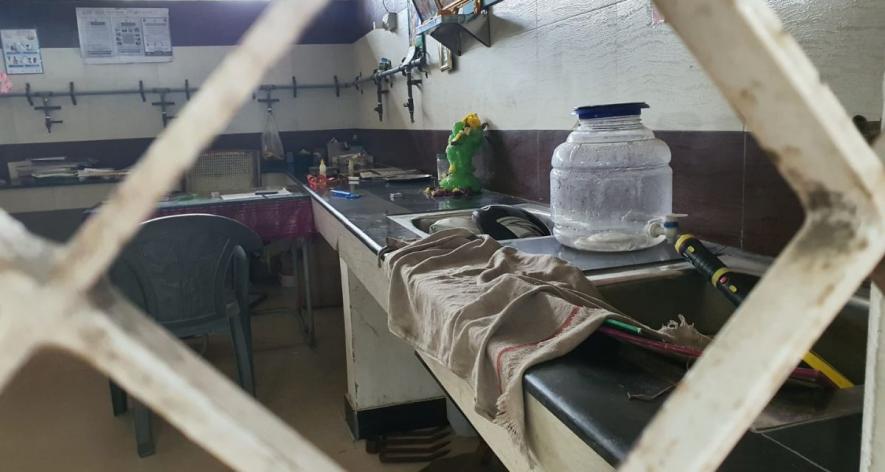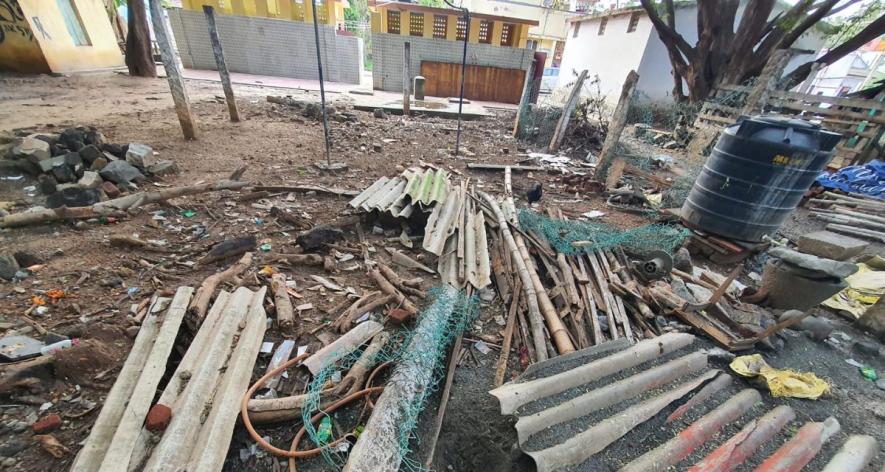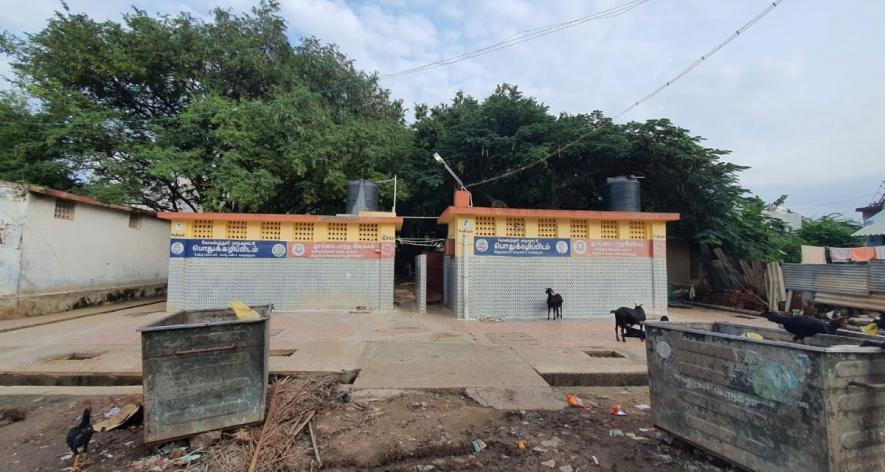TN: ‘If They are Least Bothered About our Drinking Water, Why Offer Faeces-Powered Biogas for Cooking?’

Coimbatore: When a community kitchen powered by biogas from human excreta was introduced in the Kamaraj Nagar colony of Edayarpalayam in Tamil Nadu’s Coimbatore district, some eyebrows were naturally raised. For many, the idea of using cooking fuel generated from faeces accumulating in a nearby public toilet’s septic tank was implausible, if not disgusting.
Opened in June 2014 with 16 stoves, the community kitchen functioned only for less than a month as women of this Scheduled Caste colony complained of foul smell and itching and showed revulsion towards it. The project worth Rs 17.80 lakh was expected to serve around 73 families, and most of them did make use of the facility for a day or two. However, it did not pan out the way the Coimbatore Corporation wanted it to be.
Asked why she did not utilise the free biogas, Rani* retorted, “Are we, not humans? Why should we cook with biogas produced from human excreta? After taking a bath in the water boiled in that kitchen, I experienced itching. Even our food carried that unpleasant odour. It is reminiscent of a septic tank.”
Savitha*, another colony resident, refuted her neighbour’s claim, suggesting it was more of a mental inhibition and awkwardness, besides a case of spreading unfounded rumours. However, she did admit, “There was no foul smell initially, but it became unbearable within a few days. Yet, I continued to cook there as long as the kitchen was functional because it significantly reduced my cooking time."

Ever since the kitchen’s closure, Savitha and others have switched back to firewood use. As LPG is very unaffordable, they try to minimise its use. Any dish with a longer cooking time is prepared using firewood.
“When the kitchen was started, I felt a sense of hope and relief. However, all that was short-lived,” Savitha said, adding that drunkards took advantage of the situation and stole the burners, stoves and other equipment.
“Empty bottles of alcohol and leftover food make the place dirty and unpleasant. We reported the issue to the councillor, but there was no follow-up action,” she claimed.
Who killed the project?
According to local resident Senthil*, the plant still produced biogas. “If we turn on the regulator, we can sense it. But what is the purpose of the community kitchen if it is not functional?”
The corporation claimed the kitchen became inoperative because people did not want it. “They complained of foul smell. We will not reopen it as that would be against the people’s wishes,” Sakthivel, Corporation Officer, West Zone, Coimbatore, told 101Reporters.
Elaborating how the project as a whole was perceived as lacking in value, Karamallayan, General Manager (in-charge), Tamilnadu Energy Development Agency, told 101Reporters that it was not just the biogas from faeces that people viewed unfavourably. “For instance, there is a biogas plant on temple premises in Chennai to utilise temple waste such as flowers. However, even that plant was shut as people perceived it as a by-product of waste.”
He emphasised that the first and foremost step to ensure the continuous operation of biogas plants was to raise awareness within the communities.
Explaining the science behind the biogas odour, Desikan Ramesh, Professor and Head of Renewable Energy Tamil Nadu Agricultural University, said, “Microorganisms in the septic tank break down faecal matter. When cleaning solutions that inhibit the growth of good bacteria are used, this process is disturbed, leading to a foul smell from the biogas produced. So, due care should be taken while selecting toilet cleaners.”

Asked about the theft of community kitchen equipment, Sakthivel said he had no idea if any action had been taken as he was posted in Edayarpalayam only a year ago.
“The corporation commissioner, mayor and councillor attended the inauguration of the community kitchen. That was it. After that, no corporation or local body official took time to review the project," Rani blamed.
Setting wrong priorities
Edayarpalayam panchayat became a part of the municipal corporation of Coimbatore a decade ago. The people of the colony are mostly involved in informal jobs in the corporation. Women work as housemaids in nearby residential areas. They live in houses with only one or two rooms and lacking in proper upkeep. The children of the households are mostly uneducated or have limited educational backgrounds.
According to Savitha, their concerns were heard when they were under the panchayat. “As members of an oppressed caste, we are always ignored. Local body officials come calling only during elections.”
Echoing her, Senthil said, “No one asked us about our needs. They imposed this project on us without any consultation. When it rains, our houses get submerged in knee-deep sewage-polluted water. We have to use motors to pump it out. Else, we will remain stranded," he added.
Problems do not end there. Senthil cited the case of their water tank, which has developed a big crack. “It is on the verge of collapse. Neither repairs happened nor at least a show of concern from the official side. If they are least bothered about our drinking water, why offer biogas for cooking? It seems our basic needs and safety are being overlooked,” he stated.
Savitha also shared about other pressing concerns of the community. "For us, addressing our basic necessities is far more important than the biogas project. Our houses are on the verge of collapse, yet we have not been granted land titles (pattas) for the small plots we inhabit. Without land titles, we are unable to access loans or government schemes.”
“It is ironic that we continue to pay house taxes to the corporation, which are higher than what we used to pay under the panchayat. When we lack proper shelter, the value of biogas diminishes in our lives,” she added.
Rani was equally vocal while listing out the needs. “Clearing out bushes and shrubs from our residential area should be the first priority as snakes enter our homes quite often. We live in constant fear every day, especially with our children around us. Our safety is at stake, and we are desperately in need of a secure environment."
Speaking anonymously on behalf of the children in the community, a child shared, "We lack basic amenities and do not have a safe space to play. We are not allowed to play outside due to the presence of snakes and alcoholics, besides poor sanitation. It is a difficult and restricted environment for us."
Thirumal, Zonal Sanitation Officer, West Zone, Coimbatore Corporation, denied the presence of snakes and other sanitation issues but assured that suitable action would follow after site inspection. However, the residents argued, “Even yesterday, snakes entered our homes.”
More construction on the way
A year ago, the community kitchen was converted into an office of the corporation to register the attendance of sanitation workers. “People did not use the kitchen, which is why it has been repurposed. No one has so far approached us seeking the kitchen’s revival. If people need it, we will work on that,” assured Tamilselvan P, corporation councillor, Edayarpalayam.
Several officials of the Coimbatore Corporation did not respond to queries about the project closure, stating that they were new to the office and were not aware of the details.
Meanwhile, Rani expressed her frustration with the functioning of the civic body. "It has become a habit of the corporation to impose projects on us without seeking our consent. Currently, they are constructing a primary healthcare facility near the community kitchen building. We do not want that. Now, medical waste will be dumped on us, exacerbating the existing waste issue. Instead of community kitchens or hospitals, what we truly need is access to clean water, improved sanitation and proper shelter," she summed up.
(Gowthami Subramaniam is a Tamil Nadu-based freelance journalist and a member of 101Reporters, a pan-India network of grassroots reporters)
Get the latest reports & analysis with people's perspective on Protests, movements & deep analytical videos, discussions of the current affairs in your Telegram app. Subscribe to NewsClick's Telegram channel & get Real-Time updates on stories, as they get published on our website.














